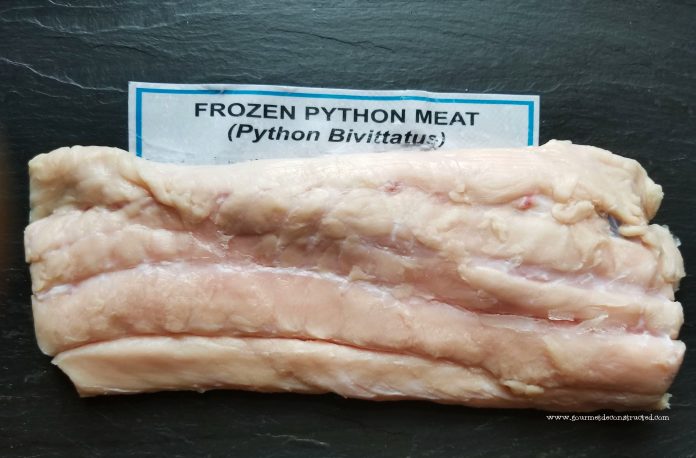In a groundbreaking study published in Nature Communications, researchers have explored the potential of farming pythons as a sustainable source of protein.
The study, titled, Domestication of the Burmese Python as a Sustainable Source of Livestock and Leather, sheds light on the feasibility and benefits of python farming for food production.

Pythons, known for their large size and constricting abilities, are traditionally associated with the exotic pet trade and their use in leather production. However, this research marks a paradigm shift by considering pythons as a viable option for human consumption.

Lead author Dr. Samantha Rodriguez from the Department of Wildlife Biology at the University of Florida explains, “Farming pythons offers a promising solution to address global food security challenges. These reptiles have high reproductive rates, low feed requirements, and efficient conversion of feed into body mass, making them an attractive alternative protein source.”
this research marks a paradigm shift by considering pythons as a viable option for human consumption
The study outlines the successful domestication of Burmese pythons (Python bivittatus) in controlled farming environments. Through selective breeding and optimized husbandry practices, researchers have demonstrated the potential for large-scale python production without relying on wild populations.

“Our findings show that python farming can be conducted ethically and sustainably, with minimal environmental impact,” says co-author Dr. Alejandro Martinez, a specialist in reptile ecology and conservation. “By establishing python farms, we can alleviate pressure on wild snake populations and reduce the risk of illegal harvesting and trade.”
pythons have high reproductive rates, low feed requirements, and efficient conversion of feed into body mass, making them an attractive alternative protein source
Python meat, rich in protein and low in fat, offers nutritional benefits and culinary versatility. With proper processing and marketing strategies, python meat could become a valuable addition to global protein sources, particularly in regions facing food insecurity.

Furthermore, python leather, renowned for its durability and unique texture, presents additional economic opportunities for farmers. Sustainable python farming practices can meet the growing demand for exotic leather products, while supporting rural livelihoods and conservation efforts.
While the idea of consuming python meat may be unconventional for some, proponents argue that embracing alternative protein sources is essential for sustainable food systems in the face of climate change and resource constraints.
Python meat, rich in protein and low in fat, offers nutritional benefits and culinary versatility
The study’s authors advocate for further research, policy support, and public education to promote the acceptance and integration of python farming into mainstream agriculture.


